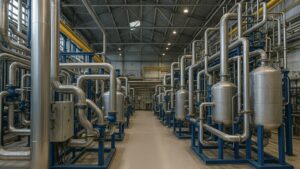Like most energy-intensive industries, food and beverages need to be extra careful going into this year. With energy prices soaring and dropping regularly, it can be hard to make long-term plans. Companies need to consider production from a variety of perspectives, including cost, emissions, and even waste.
1. Decarbonization in the supply chain
It shouldn’t be a surprise, but the last few years have seen a lot of pressure put on companies to decarbonize. With Scope 3 emissions reporting likely to become fully mandatory, businesses need to have a plan. Since Scope 3 covers the entire supply chain, companies need to know both their upstream and downstream carbon emitters. Companies will need to think about how to best approach sustainable packaging, for example. Similarly, it will be necessary to understand the emissions of suppliers and logistics providers. Ideally, companies should start evaluating every entity on the supply chain and look for problem areas. This would require a comprehensive overview of nearly all operations, but without this data, preparing for Scope 3 is impossible.
2. Renewable energy in production
Dovetailing off the previous point, energy remains one of the main issues for food and beverages. As previously stated, this sphere is very power intensive, between heating, cooking and refrigeration. The first challenge a company has to grapple with in 2023 is cost. Energy prices are still in a state of flux brought on by the 2022 war in Ukraine. Simultaneously the world is pushing for renewable energy. Practically, this often means that cheaper, fossil fuels are penalized. Regardless, many companies are likely to look into renewable energy as an alternative. Firstly, it offers a degree of stability. In the long term, it is predictable. A solar plant owned by a food packaging factory does not need to care too much about global energy prices. Secondly, renewable energy may help the company receive certain tax benefits and subsidies. Overall, the cost of establishing such a power source is initially high, but it is likely the energy of the future. Late adopters are likely to miss out on the benefits.
3. Reducing food waste post-production
When demand is high, companies can afford to overproduce. Food and beverage is a unique field in the sense that much of the production has a very short shelf life. This often translates directly into food waste. Now, this isn’t to say that the food and beverages industry is uniquely to blame for this issue. Consumers and restaurants also tend to discard a lot of food. But in the US, for example, almost 40% of food waste comes from the industry. Besides wasting money on raw materials and other costs, food waste can produce greenhouse gasses. Food waste prevention will become more important as companies are pushed to decarbonize across the entire supply chain. Businesses need to have plans in place to either reduce overall waste or dispose of it in a more carbon-friendly manner.
4. Automated production
AI technology is developing in leaps and bounds these last few years. Self-driving cars and trucks will soon be a reality. Many companies use automated machines to produce their goods, while the mining industry, for example, already uses self-driving equipment. In the past, the cost of acquisition was the main barrier of entry in many industries. This was particularly true in industries where there was not as much demand for expensive, high-skilled workers. But now automation is developing at such a pace that many industries should consider exploring the options.
5. Plant-based alternatives
Not all trends are driven by global factors. Sometimes, consumers have a relatively high impact on yearly fads. Plant-based and generally vegan food is likely to remain popular among certain elements of the population. As “regular” consumers become more familiar with these products, they may be integrated into normal diets. Currently, plant-based alternatives are still more of a luxury, but as their production can be scaled more effectively than meat, this may change. Should the cost-of-living crisis extend into 2024, many non-vegans might still consider buying plant-based food.
6. Consumer sentiment
On a macro scale, companies need to be aware of other consumer demands. While most food companies can reliably predict and guide preferences in flavor, consumers are starting to have other concerns. Sustainability is important for many, for example, nearly 60% of respondents in one UK study listed it as important. Where the produce is sourced and the recyclability of the packaging is becoming an important factor when choosing what to buy. There is a silver lining to this. Since companies will already have to report Scope 3 emissions, the cost of reading them may be mitigated by increased sales.
What should companies consider?
Unfortunately, there are few easy answers. While the issues above are straightforward, what a company can do to solve them is highly relative. In general, businesses need to start planning and exploring options. One great way to do this is to learn from peers that have already begun the process.
The Global Summit on Scope 3 Emissions Reduction will bring together key industry experts to learn more about reporting strategies & carbon data management in a small-scale, industry-driven event, on 20-21st April 2023 in Amsterdam, the Netherlands. The two-day, hybrid event features in-depth case studies of supply chain transformation, carbon accounting, and networking breaks dedicated to exchanging insights and expertise on tackling Scope 3 emissions. Visit future-bridge.eu and netzero-events.com or follow us on our social media to track other energy use and decarbonization events.





